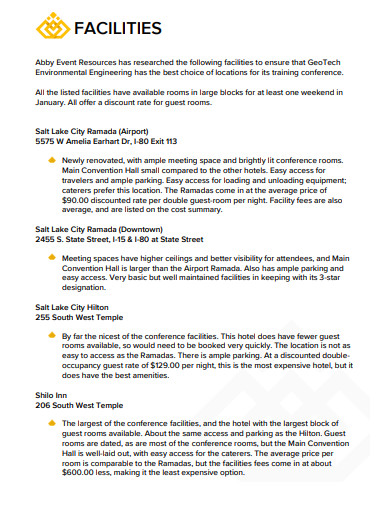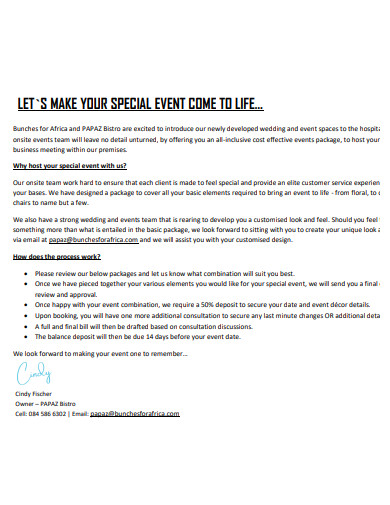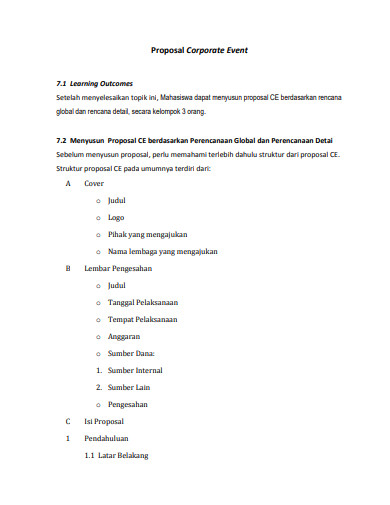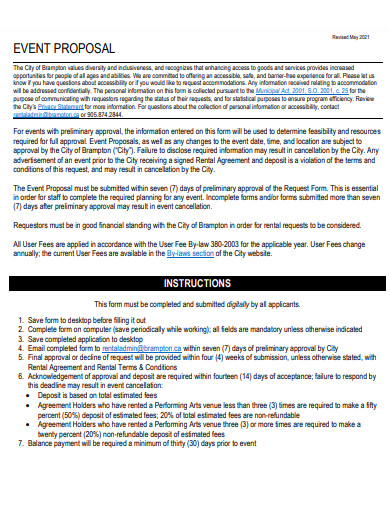Corporate events are essential in every business since it is vital to maintain connections with different types of people to help boost their business. That’s why businesses need to promote social gatherings and do networking with other business people and clients. If you’re assigned as in charge of corporate event planning, then it is your responsibility to brainstorm events that will promote your company and propose these ideas to your superiors. Read the article to know how to create a corporate event proposal.
4+ Corporate Event Proposal Samples
1. Corporate Event Proposal

2. Corporate Event Planner Services Proposal
3. Wedding and Corporate Event Proposal
4. Sample Corporate Event Proposal
5. Simple Corporate Event Proposal
What is a Corporate Event?
A corporate event is any form of social activity that is organized or funded by a business entity. Businesses do this to educate reward, motivate, celebrate milestones, manage organizational change, or encourage collaboration from other businesses. Most people who attend these events are employees, board members, stakeholders, customers and clients, and potential clients.
How to Create a Corporate Event Proposal
1. Know the Purpose of the Event
If you know what event you will be throwing and know its main purpose, you can identify what goals and expectations that you like to accomplish and to happen. Then choose a theme for the event and determine what format is the best for your event. Make sure this is clear enough so that your superior will know what the event will be about.
2. Set a Realistic Budget
The next thing to do in your proposal is to work out the budget you will need for the event. You need to know how much money you have to work with to determine what sort of event you can produce. Determine which important resources (such as food and beverage, decorations, venue, and personnel to hire) are essential to your event. This is where the budget of the event will be based on.
3. Establish a Project Timeline
Make a timeline of the event starting from the planning process, to the preparation, to the day of the event itself, and the post-event activities to do to determine the success and impact of the event. Make sure to attach a calendar and point out relevant deadlines. This will show how the event is feasible enough to be successfully done.
4. Decide Who Your Target Audience Is
Know which type of audience you’d like to invite to your event. Will it be the company’s executives, managers, clients, business partners, community members, or a combination of those groups? Once you know who your target audience is, you can properly format the program of your event according to their interests.
5. Plan the logistics of the Event
To ensure that your event is successful, you need to identify which personnel is needed for the event. You need to book caterers, audiovisual technicians, printers, decorators, photographers, florists, security personnel, speakers, and presenters, etc. to help you prepare and do the event. When you plan the activities to do on the day of the event, create a balance between keeping attendees engaged in the program and giving them some freedom to socialize. Propose promotional giveaways with the company logo, such as gifts or knickknacks to give to guests.
6. Determine Your Promotion Strategies
Determine how you will advertise the event to your guests to let them know an event is coming up. You can do the traditional sending out invitations but you can also go the extra mile and promote on social media, websites, or even ask influencers to promote your event in the socials, vlogs, and blogs. You can use a hashtag across several online platforms to keep the buzz going on.
FAQs
What are the most common types of corporate events?
The most common types of corporate events are conferences, seminars, team building events, trade shows, executive retreats, corporate dinners, corporate golf days, product launches, guest speaker presentations, networking sessions, and workshops.
What are the different types of corporate event planners?
The different types of corporate event planners are corporate meeting and seminar planners, corporate bonding retreat planners, and conference planners.
What skills do you need to be an event planner?
The skills you need to be an event planner are organizational, communication, problem-solving, and multitasking skills, an expert in negotiation and budgeting, savvy in networking, and at least a basic understanding of events.
Once you’re done writing your proposal, make sure to review it first to find any grammatical and spelling errors, lacking or inaccurate information that you can revise before you send the final proposal document to your superiors. Make sure the proposal is written clearly and concisely. Discuss the proposal to them and make sure to answer their questions well. To help you get started on making the event proposal, download the free sample templates we provided above to use as your guide.
Related Posts
FREE 7+ Corporate Sponsorship Letter Templates in PDF MS ...
FREE 59+ Event Proposal Samples in MS Word PDF | Excel ...
FREE 12+ Sample Event Sponsorship Letter Templates in PDF ...
FREE 10+ Sample Event Proposal Letter Templates in PDF MS ...
FREE 5+ Event Planning Business Plan Samples [ Startup ...
FREE 38+ Event Program Templates in PDF MS Word
FREE 14+ Event Budget Templates in Google Docs Google Sheets ...
FREE 9+ Sample Sponsorship Proposal Letter Templates in PDF
FREE 19+ Sponsorship Proposal Samples in PDF MS Word ...
FREE 9+ Sample Training Proposal Letter Templates in PDF
FREE 16+ Sample Event Planning Checklist Templates in Google ...
FREE 12+ Event Budget Proposal Templates in PDF MS Word ...
FREE 26+ Event Brochure Samples in PSD EPS | Apple Pages ...
FREE 15+ Event Budget Samples in Google Docs Google Sheets ...
FREE 23+ Sample Event Calendar Templates in PDF MS Word ...




